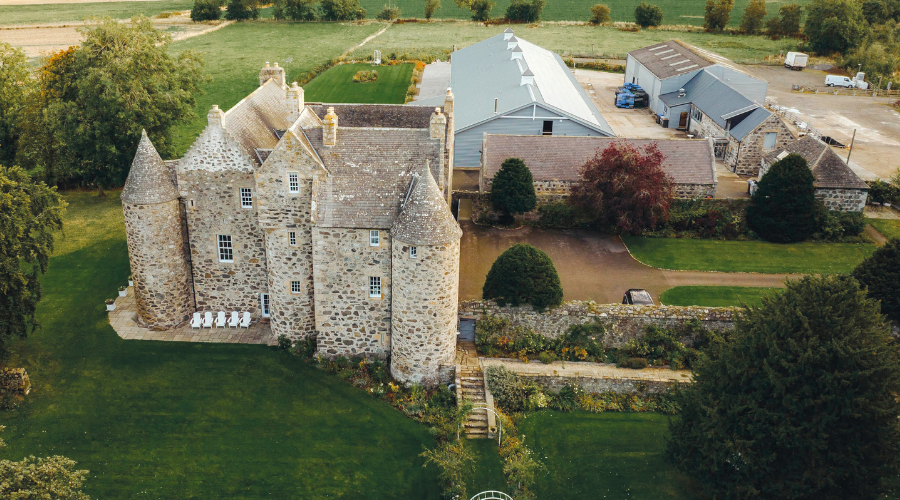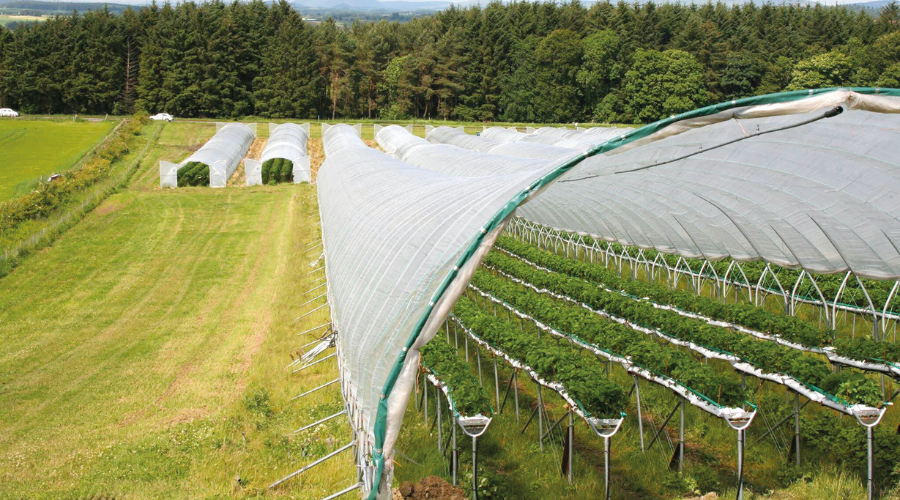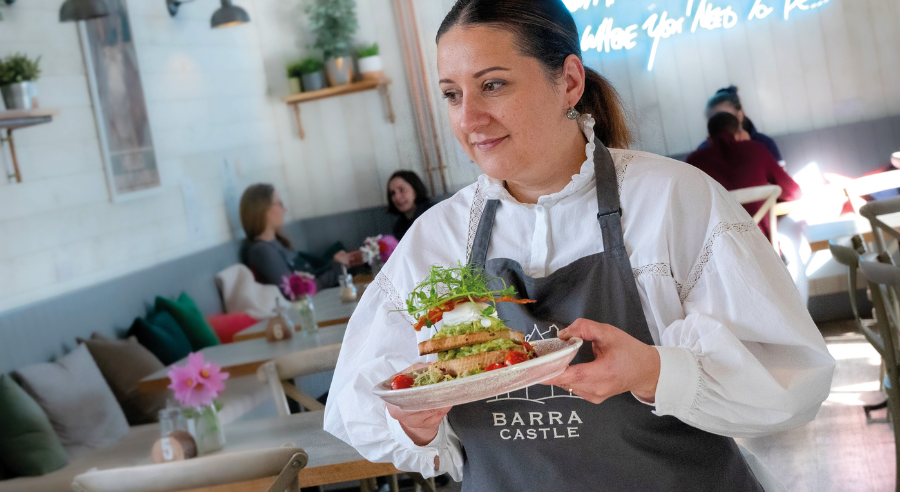Diversifications help fruit business thrive in tough times
8th May 2025
Barra Berries opened their 13th century tower house for a series of diversifications including weddings, accommodation, a restaurant and farm shop, alongside their livestock and soft fruit businesses. Sarah Kidby reports.

Husband-and-wife team David and Sarah Stephen have launched a growing number of diversifications over the past 10 years, from their captivating Scottish castle in Aberdeenshire – an unusual L-plan tower house that dates from the 13th century.
Alongside their 700-acre cattle and sheep farm, and 25-acre soft fruit growing enterprise, Barra Castle was renovated in 2009 and now offers weddings in a unique barn venue, which opened in 2017, and accommodation in the luxury lodges, which are former gatehouses to the castle.
Meanwhile there’s the Barra Farmshop and Kitchen which serves breakfast, lunch and Barra Berries ice cream, as well as homemade sweet treats and hot drinks.
Additionally, the farm is 80% powered by the sun having installed solar panels in 2022.
The spread of their businesses has helped them to survive the tough times brought by Covid-19 and other challenges, Sarah explains.
120-year history
The land has been farmed by the Stephen family since 1904, initially as tenant farmers, until the land was bought in the early 1990s.
While fourth generation farmer David, who took over the farm in 2000, was born and raised in the industry, Sarah grew up in Glasgow and worked in broadcasting for 30 years, before stepping into the business on the diversification side 10 years ago.
Formerly a purely livestock farm, they put up the first polytunnels and began growing 6 acres of raspberries in 2003 at the behest of Angus Soft Fruits.
Today, they grow 25 acres of strawberries, raspberries, blueberries and honeyberries (haskap berries).
They also grow asparagus to sell commercially, as well as seasonal vegetables such as courgettes, cucumbers, lettuce, tomatoes, onions, rhubarb and herbs for the farm shop and restaurant – they’ve even tried growing melons and watermelons.
Taste and longevity
Fruit is sold for the fresh market via Angus Soft Fruits, and packed at another grower’s farm.
Whilst the aim is for all fruit to be sold fresh, waste fruit is used for making jams and ice creams for the farm shop when necessary.
They use Mackie’s of Scotland vanilla ice cream and blend the frozen fruit through it – with a chill and freezers on-site for fruit storage.
Fruit taste is a key priority for Sarah and David, while longevity is a major factor for the supermarkets.
Magnum is grown for the finest strawberry ranges, while Malling Ace and Karima are the everbearers.
Raspberries were 100% Lagorai, but they are now moving over to the new varieties from Angus Soft Fruits, Monet and Dali, for their finest ranges.
It’s hoped that these varieties will make up 60% and 30% respectively of the raspberry hectarage going forward.

“Certainly Monet in particular looks like it’s got a fantastic promise,” David comments.
It was grown for the first time on a small-scale in 2024 and they will expand this year.
Taste is a key attribute of the variety, but while this often comes at the cost of shelf life, that is not the case with Monet, David explains.
The two new varieties went into year-round commercial production in 2024, with yield, crop management and picking costs among the key considerations in their development, in response to challenges in the sector, the breeder said at the time of the launch.
AVA Monet has short, compact laterals, whereas Dali has a longer structure but a canopy that is not too dense.
The high-yielding berries also stand out for their size and weight – on average, AVA Monet weighs 9g in UK production, while AVA Dali is 8g.
AVA Monet yields 1.4kg per cane with a shelf life of nine days from harvest, and AVA Dali yields 1.1kg/cane and has a shelf life of eight days from harvest.
Northern location a benefit
One advantage of Barra Berries’ site just one mile south of Oldmeldrum, Aberdeenshire, is they are about 40 miles further north than most of the growers in the Angus Soft Fruit group – and subsequently suffer less with pest and disease.
Mildew is something a lot of the other growers suffer with, and Ace is susceptible, but they seem to fare better, David says.
Botrytis and aphids are always a bit of a problem, as are vine weevil, spider mites and thrips, however.
Some chemicals are available but with a greatly depleted armoury, so pests at Barra are mostly managed with beneficial insects – and they also use garlic to keep the aphids out of the tunnels.
For thrips, sticky traps are most effective and make a big difference to the numbers, David adds.
Being under polytunnels, frost isn’t a major issue, although two years ago temperatures fell to -5ºC in April which knocked off a lot of flowers – but that was the worst instance in 20 years.

Inspired by NZ
Having started the fruit business in 2003, spending time in New Zealand prompted the couple to consider adding diversifications to their repertoire.
Inspired by the pioneering attitudes and ambition they saw in growers there, they decided to make use of their redundant buildings.
Like the rest of the hospitality sector, the whole business was badly hit by covid, however, Sarah notes.
“The farm was vibrant during covid despite what was going on globally – hospitality took a hit, but we didn’t sit back, we just said ‘right, whenever we can reopen, we’ll get reopened’,” she says.
“Getting back to being operational was really important for us, despite all the restrictions. We’re not a big farm shop but we’re popular and I think we offer something slightly different to what’s out there.
We want to have a different menu and a different personality and vibe. That’s really been the backbone of the diversification.”
One of the key challenges with the diversifications has been navigating planning permission – particularly with a listed building – and Sarah says she knows many others in hospitality who are struggling with the same red tape.
The diversifications have also forced them to be bold and less risk averse – but making those decisions as a couple helped ease the burden.
The level of commitment needed for the businesses came as a surprise to them, she adds: “For the past 10 years, I’ve been in the restaurant making coffee, Dave’s been in mending machines.
You have to be invested personally in the business.”
However, the pair are now at the stage where they have good management in place so they can take a step back.

Robotics aspirations
Unsurprisingly, recruitment is a key challenge for the business and they use the Seasonal Agricultural Workers Scheme (SAWS) to recruit fruit pickers.
However, the work ethic is excellent, David says, with raspberries being picked at a phenomenal rate. Overall, there are about 15–20 permanent staff across the business, increasing to 30-plus during the harvest.
Whilst mechanical fruit picking is unlikely to be feasible for the farm, David is interested in mechanising other farm tasks – for example using a drone spraying service within the tunnels to replace their aging 30-year-old sprayer.
Similarly, using robots to pick up trays of fruit and transport them to the chill could be an option in future.
“A picker can waste quite a lot of time taking their fruit down to get checked in,” David explains. “If they never had to stop picking, I bet that would save 15–20% of their time, and they could be picking instead of walking down the trays.”
Not the type to rest on their laurels, Sarah comments on the next stages for the business: “We’re always adding to the business, we’re not the finished article.
It’s about where you move next and where you think the investment should be.”
Visit the Barra Castle website for more information.
Read more fruit news.
